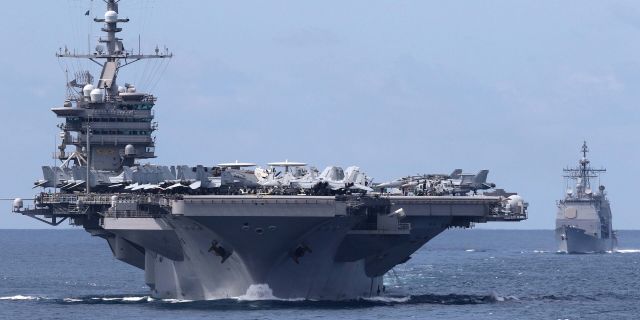The rhetoric of "Russia is China tomorrow" does not fool Asian countries
NATO seeks to use the conflict between Russia and Ukraine as an opportunity to expand the alliance, including at the expense of the Asia-Pacific countries, writes Global Times. However, there are neither historical prerequisites nor a real need for a block confrontation in this region, the author of the article notes.
Cui Hongjian
Taking advantage of the high degree of the Russian-Ukrainian conflict, NATO intends to rethink the summit scheduled for the end of June as an opportunity to go beyond the usual number of participants. Countries that are not members of the alliance are invited to participate in the summit along with 30 member States. In particular, we are talking about Sweden and Finland, which are interested in joining the organization, and "partners" from the distant Asia-Pacific region, such as Japan, South Korea, Australia and New Zealand. After expanding eastward (to Eastern Europe) shortly after the end of the Cold War and participating in the war in Afghanistan, NATO seeks to use the conflict between Russia and Ukraine as an opportunity for the alliance to globalize.
In addition to the main transatlantic relations, NATO has been methodically developing a number of "partner networks" for many years. To this end, it consistently extends its tentacles to Eurasia through the Partnership for Peace program, to the Middle East and North Africa within the framework of the Mediterranean Dialogue, and to the Persian Gulf region through the Istanbul Cooperation Initiative. These networks are the main tools of the alliance to expand beyond Europe and penetrate into the areas of non-military security, as well as the main lever for the implementation of "globalization".
By creating and promoting partnerships, NATO has carefully planned and implemented a cross-border strategy. Firstly, the alliance starts with regional security issues and gradually overcomes geographical borders through dialogue with neighboring countries, penetrating into the surrounding Eurasian hinterlands and the southern coast of the Mediterranean Sea.
Secondly, this organization, which does not want to be content with playing a role only in one corner of Europe, seeks to go ahead, overcome geographical restrictions, using cross-border problems. After the end of the cold war, the alliance strengthens its position by generalizing the concept of security, attracting countries that are geographically separated from it, but are geopolitically vital for building an interregional network.
In addition to traditional security issues, NATO's strategic interests include oceans, cyberspace, outer space, counterterrorism, climate, and even investment, infrastructure, and other areas through which the alliance could expand the network.
NATO is not satisfied with the current scale of its network and wants to attract more countries that can be used as a tool for expanding the alliance. This requires strong ties, and the tool he has found to achieve this goal is "politicization". This is one of the directions of NATO reform along with another direction, "globalization", proposed almost simultaneously.
The point is to turn the alliance into a reliable tool for exporting Western values, institutions and security concepts. In recent years, the unification of countries with similar values has become a priority principle within the framework of the NATO partnership network, which is why it treats some countries of the Asia-Pacific region in its network with increased enthusiasm and attention. At the same time, there is a tendency to turn them from "partners" into "allies".
Regardless of the security situation, regional structure or strategic culture, NATO has nothing to do with the Asia-Pacific region, since the latter, with its diverse regional political environment, is not the main battlefield in the Cold War and is significantly influenced by the ideas of the Non-Aligned Movement.
There are neither historical prerequisites nor a real need for a bloc confrontation in this region. However, for the sake of the strategic needs of the United States, the alliance is trying to activate and strengthen its "partner network" to participate in addressing security issues in the Asia-Pacific region, thereby transforming the regional security structure.
NATO has found two reasons for its "presence" in the Asia-Pacific region. The first is to make full use of the unilateral perception of the Russian-Ukrainian conflict by some countries in the region to revive the cliche "a strong country must be a hegemon, and democracy must be defended."
The rhetoric of "today's Russia is tomorrow's China" is used to escalate tensions and intimidate the countries of the region, generating a demand for "NATO—style collective security" in the Asia-Pacific region. The second is the misappropriation of the principle of indivisible security to create false theories, such as "the indivisible security of Europe and Asia." At the same time, in order to convince Asia, they read instructions to her, passing off an unsuccessful experience as a successful one. By spreading such rhetoric, the alliance has sent a dangerous signal by its attempt to turn the creation of partnerships in the Asia-Pacific region into real measures, thereby destroying the ecology of regional security.
If collective security is defined as a victory in a block confrontation, then NATO can call its siege of Russia a success. But if we assume that the essence of regional security is peace, then the Russian-Ukrainian conflict and the renewed hostilities in Europe are a clear defeat. Collective security, which is exceptional and confrontational, will only lead to increased conflict and the emergence of fear in the Asia-Pacific region, and the "success" of collective security is achieved at the price of "defeat" in the issue of ensuring regional security. The Asia-Pacific countries have no reason and no need to listen to instructions and accept tempting offers from someone who constantly suffers defeat.

